UK, France, Germany Condemn Iran’s Missile Advances
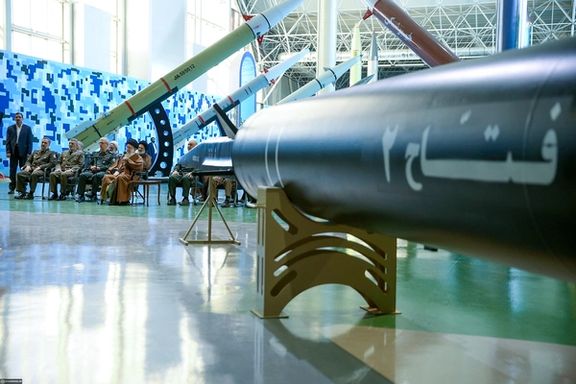
The UK, France and Germany have condemned Iran’s missile advances about a week after the unveiling of the Fattah-2, a ballistic missile that Tehran claims is “hypersonic.”

The UK, France and Germany have condemned Iran’s missile advances about a week after the unveiling of the Fattah-2, a ballistic missile that Tehran claims is “hypersonic.”
In a joint statement, the so-called E3 Iran continues to develop its missile program despite repeated international calls to halt it, and after years of disregarding UN restrictions.
Iran unveiled the new ballistic missile variant on November 19. Fattah II is reportedly equipped with an advanced warhead and hypersonic glide vehicle capable of maneuvering at high speeds to evade air defense systems. The missile was put on display at Ashura Aerospace Science and Technology University, a division of the Islamic Revolutionary Guard Corps (IRGC) in Tehran. Iran’s Supreme Leader Ali Khamenei visited the site to review an exhibition of new weapons systems, among them the Fattah II.
Highlighting the “grave threat Iran poses to global and regional security,” the countries decried Iran’s continued development of its ballistic missile program that “follows continued nuclear escalation, beyond all credible civilian justification, and previously conducted research on nuclear weapons delivery.”
The expiration of UN sanctions on Iran's missile program in October has raised concerns about the accelerated proliferation of potentially dangerous weapons. Iran is now free to sell its drones, ballistic missiles, and related long-range strike technologies to its anti-Western partners and clients and can also procure technology for further development.
The lifting of sanctions provides Iran with the opportunity to generate revenue from missile sales, potentially using the profits to finance militant and terror proxies in the Middle East.
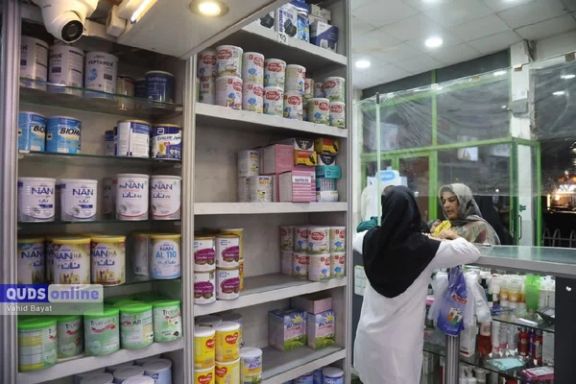
Shortages of powdered milk and baby formula continue in Iran, as prices jump by at least 40 percent because the government has not provided foreign currency for imports.
The shortages began in March and reports in local media say most pharmacies and drug stores have run out of locally produced and more affordable powdered milk. Factories in Iran rely on imports of raw materials to produce powdered milk, which in turn need foreign currency allocation by the government.
Imports of major foodstuff, medication and other necessities depend on the government providing around $15 billion of foreign currency annually, but allocations have been slow in the past two years and prices have skyrocketed.
Reports indicate that baby formula packaged abroad and imported in small quantities is available, but each package costs up to $15, which most Iranians cannot afford. Average monthly wages for workers is $150 and food price inflation has been running at around 80 percent in the past two years.
Media in Tehran have also been reporting shortages of medication, while some government officials periodically deny any problems. The government allocates around $3 billion to import raw material for pharmaceutical products.
It is difficult to explain the government’s reluctance to provide sufficient foreign currency for imports of essential goods, when it says its oil exports have increased. The United States also agreed recently to allow around $16 billion of Iran’s frozen funds to be unblocked.
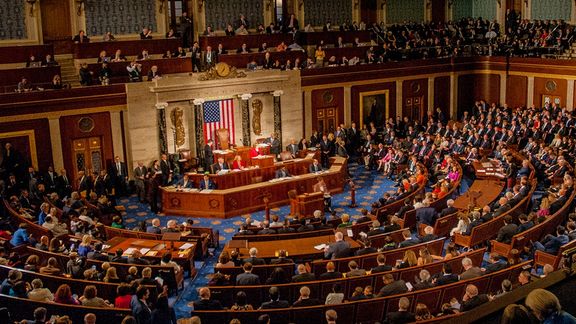
The US House of Representatives passed a bill Thursday that would permanently freeze Iran’s $6 billion, released as part of a prisoner swap deal in September.
The bill, named the No Funds for Iranian Terrorism Act, is yet another Congressional move aiming to pressure the Biden administration to harden its stance on Iran. Ninety Democrats joined all but one of House Republicans to pass the bill 307-119.
Rep. Michael McCaul, who introduced the bill, slammed the administration for making funds available to a government that sponsors Hamas, questioning the administration’s motive.
“There’s something else going on here,” McCaul said, “a deal we don’t know about,” suggesting that the Biden administration may have released the $6 billion to help bring about another nuclear agreement with Tehran.
Republicans have been opposing the ‘hostage deal’ ever since it was announced in August, but their opposition has intensified since October 7, when Hamas attacked Israel, killing 1,200 and taking more than 200 hostage.
“The idea that you can just take Hamas and keep it separate from Iran has always been a farce,” said House Majority Leader Steve Scalise. “Iran funds Hamas, and everybody knows it… We shouldn't even need the bill. The administration should be standing there saying we're not giving them the money anymore.”
But those close to President Biden argue that releasing the $6 billion had been necessary and key to securing the release of five Iranian-American hostages.
“Every member of Congress who was aware of these cases wanted our fellow citizens home,” said Rep. Gregory Meeks, ranking member of the House Foreign Affairs Committee. “Reneging on the deal would hurt U.S. global credibility.”
Biden critics say the deal has sent a signal that the US government would “reward hostage-taking”. They accuse Biden of emboldening the regime in Iran as well as its proxies across the Middle East.
Since mid-October, when Israel began its onslaught on Gaza, Iranian-backed groups have launched dozens of attacks on US forces in Iraq and Syria. And from Yemen, the Houthis have been launching drone and missile attacks.
Not surprisingly, the bill was amended Thursday to state the Iranian-backed Houthis are benefitting from the Biden administration’s failure to condemn them, and perhaps more importantly, prohibit the use of US federal funds for Iran.
“There is only one language that is understood by our adversaries,” Rep. Keith Self said on the House floor in support of the bipartisan bill, “that is strength.”
The bill will have to pass the Senate, which is not likely given the Democratic majority in the upper chamber. But if it were to pass and turn into law, it would impose new sanctions to prevent any transfer of money to Iran.
Republican lawmakers in both chambers are aggravated by what they see as President Biden’s soft approach to Iran. Some have gone so far as to call his policy “appeasement.”
“This administration has subverted Israel and boosted Iran for nearly 3 years,” Senator Ted Cruz posted on his X account. “Rob Malley, who headed up his nuclear negotiations with Iran, had Iranian spies working under him at the State Department.”
On Thursday, 25 Senators signed an open letter to oppose the administration’s sanctions relief to Iran.
Addressing the three secretaries of State, Defense and the Treasury, the Senators (led by Senator Tim Scott) conveyed displeasure at the fact that despite attacks on American troops, “it is business as normal on the economic front."
The letter reads: “We therefore request that your departments provide us with a classified assessment on the administration’s plan to deter Iranian aggression and prevent the escalation of conflict in the Middle East. This assessment should be provided in a member or staff-level briefing no later than December 7, 2023.”
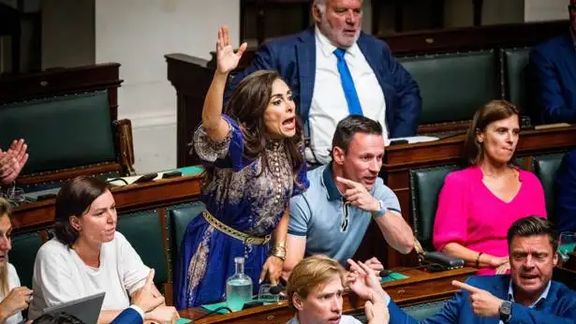
The Belgian police are beefing up security measures to protect Darya Safai, an Iranian-born member of parliament, following death threats she received on social media.
In an interview with Iran International, Safai said that the death threats against her have increased following the Israel-Hamas conflict.
“I should be careful and report any suspicious events around me” to the police, the lawmaker wrote on X.
The police has launched a probe into the nature and sources of the threats.
Safai blamed Islamists for the threats, vowing that she will continue to stand up for freedom.
“It’s incomprehensible that people should make serious threats … instead of responding with substantive arguments. But that is just how Islamists operate,” read her post on X.
Speaking to Iran International, she accused the Iranian regime of orchestrating the threats by promoting Islamist extremism in Belgium and the whole of Europe.
Safai warned that Tehran is trying to target its opponents indirectly under the guise of backing the Palestinian cause.
The alarming rise of extremism and antisemitism have raised serious concerns among European countries, with many of them blaming the Islamic Republic for fostering such activities.
In October, The Times warned that Iranian agents are stirring up unrest in the UK through Gaza protests.
There is direct involvement of the Iranian regime through the physical presence of operatives at protests as well as through disinformation campaigns conducted online, the newspaper said.
Earlier in November, German authorities executed raids on 54 locations connected to the Islamic Center of Hamburg (IZH), suspected of supporting Iran-backed Hezbollah.
On November 4, Safai condemned attempts to silence her with the label of “Islamophobe,” especially since the current conflict began in the Middle East.
“What the world is experiencing today is much broader than a war between Israel and Hamas. It is a broad war that shows the direction for certain Muslims to ultimately achieve their goals,” she said earlier this month, highlighting the Muslims’ promised goal to conquer the world and establish an Islamic rule.
Last November, Iran International was warned by London Police that its journalists were under threat from Iranian agents and the police took measures to strengthen security around the network’s offices. A man was arrested in the vicinity of Iran International’s headquarters in February and charged with a terrorism offence.
Safai has been one of the most vocal European lawmakers critical of the Islamic Republic, advocating a tougher stance towards Tehran and its regional and international policies.
She is also one of the staunch supporters of listing Iran’s Revolutionary Guard (IRGC) as a terrorist organization.
Safai told Iran International on Thursday that she has been under police protection since June after she criticized a formal invitation extended to Alireza Zakani, the mayor of Tehran, to visit Belgium. Her criticism angered Iranian officials, with some reports saying that they might try to target anti-regime activists and figures who openly opposed Zakani’s visit.
Tehran’s mayor was a hardliner member of parliament before becoming a candidate in the 2021 presidential election and withdrawing in favor of the current president Ebrahim Raisi. He also served as the head of IRGC’s Student Basij paramilitary forces and had a prominent role in cracking down on students during popular protests in July 1999.
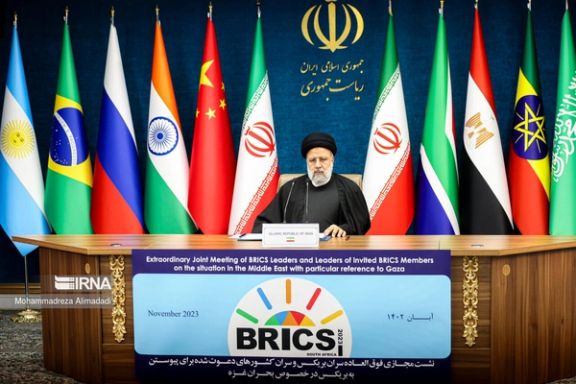
Iran's president claims he will not attend the United Nations Climate Change Conference (COP28) in Dubai, citing the presence of his Israeli counterpart.
Israeli president Isaac Herzog will be in the United Arab Emirates along with around 140 other world leaders for the world's biggest climate summit which begins Friday, to be opened by Britain's King Charles.
Fars News Agency, known for its proximity to the Islamic Revolutionary Guard Corps (IRGC), reported on Thursday that Raisi will not only be absent from the conference but will also not have a representative attending on his behalf.
According to the report, Iran will only participate in the conference at the ministerial level, with the representation led by the minister of energy.
The UAE and Israel normalized relations during the presidency of Donald Trump in the United States when in 2020 the Abraham Accords opened diplomatic ties along with other Arab nations such as Bahrain.
During Herzog's inaugural visit to the UAE last year, the Iran-backed Houthis in Yemen sent a ballistic missile to the Persian Gulf state amidst a period of attacks which killed three. The missile was intercepted by the UAE.
The Houthis' military spokesman said they fired Zulfiqar missiles at Abu Dhabi and launched drones at Dubai.
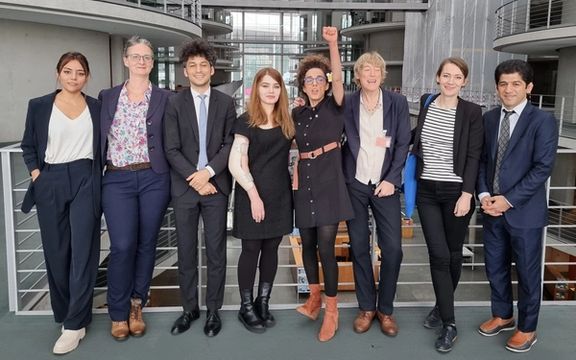
The prominent Iranian-American dissident Masih Alinejad on Thursday blasted the German government for seeking to impose a gag order on her meeting to discuss the repression of women in the Islamic Republic.
Alinejad took to X to slam the crackdown on the dissidents’ free speech, stating, “Today I walked out of a meeting with the German government because they tried to censor me. I had a meeting with officials in the German Foreign Ministry. But I was told the meeting had to be kept secret and I couldn't mention it in the media or write about it on my social media. I tried to convince the officials to publicly meet with Iranian delegation that included @simamoradb51053 young woman who had been shot during the Woman, Life, Freedom revolution last year.”
She added, “ When the ministry officials insisted on keeping the meeting a secret, I walked out. I am a women’s rights activist and I stand for transparency. How ironic that German government, with its feminist foreign policy, wants to meet with other feminists but only in secret. The German government is practicing victim blaming. I’ve heard some German officials say I’m too radical and meeting me publicly would be fatal to their Iran policy.”
According to Alinejad, “If standing up for women’s rights and wanting an end for gender apartheid regime in Iran is being radical, then I’m proud to be labeled as such. The German government is helping the Islamic Republic to silence dissidents. I refuse to play their game.
Earlier this week I had many constructive meetings with parliamentarians and ministers from different parties. I have high hope that they can be allies of Iranian women.”
The German MP Norbert Röttgen, who has been spearheading a campaign to sanction Iran’s Islamic Revolutionary Guard Corps and secure the release of German hostages held in Iran, wrote on X about Alinejad. "While this woman is brave enough to take on the Islamic regime of Iran, the Foreign Office is too cowardly to publicly stand with her. Unbelievable and shameful!”
When asked about Alinejad’s criticism of the German government, a spokesperson for Germany’s foreign ministry sent Iran International a statement from Luise Amtsberg, the Federal Government Commissioner for Human Rights Policy and Humanitarian Assistance.
The Green party politician Amtsberg, said “I was looking forward to an open and honest exchange with Masih Alinejad today. I invited her to the Foreign Office. Confidentiality was agreed upon in advance. Both sides have agreed to this framework.
In my experience, conversations that take place confidentially are more substantive - especially when it comes to individual fates. This also encourages people to contact me confidentially.”
Amtsberg added “I very much regret that Ms. Alinejad linked a conversation to the publication of the content of the conversation and broke off the discussion at the beginning. I'm sure we would have had a good conversation.”
The commissioner continued that “My door is always open to activists and civil society. I would have loved to know more about Sima Moradbeigi's story, who accompanied Ms. Alinejad. I will continue to call out the Iranian regime’s serious human rights violations and support Iranian civil society.”
Iranian dissidents have accused Germany’s government of a soggy appeasement policy toward the Islamic Republic of Iran.
Germany refuses to sanction the IRGC as a terrorist movement. The Wall Street Journal famously wrote a series of editorials in 2008 titled “Germany loves Iran” about Berlin’s efforts to enable trade with Iran. Germany continues to retain a flourishing trade relationship with Iran, permitting its banks to make vital transactions to Iran. In 2022, German companies earned over $1billion in trade from Iran.
Iran International reported in August that the giant German engineering multinational Bosch sold 8,000 surveillance cameras to Iran.